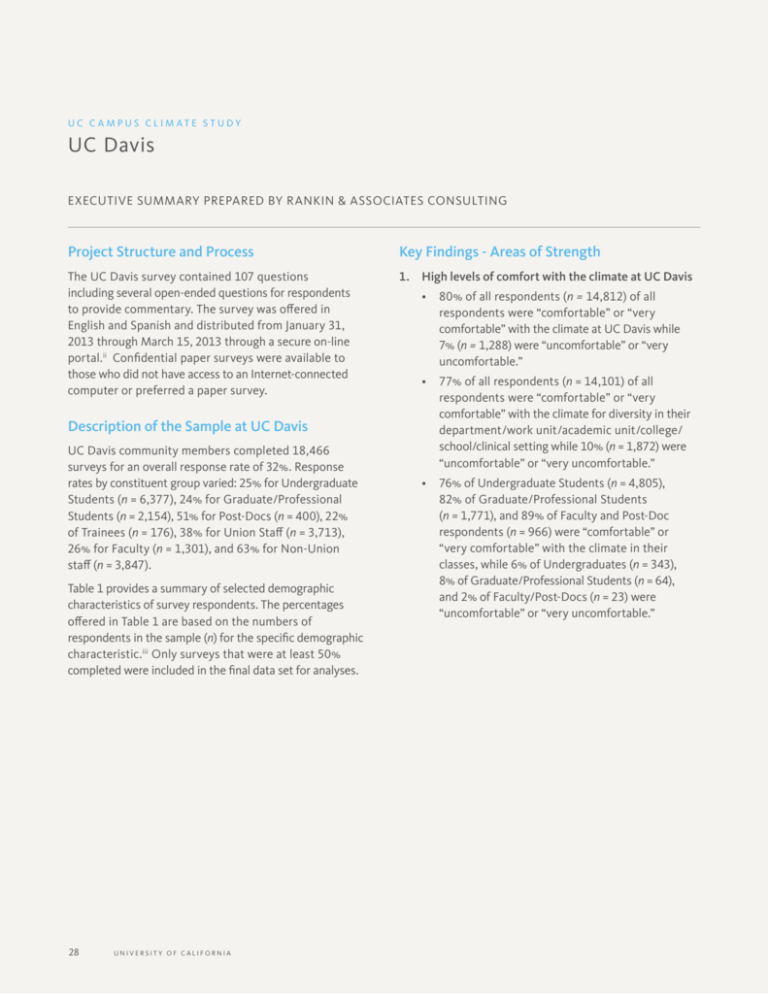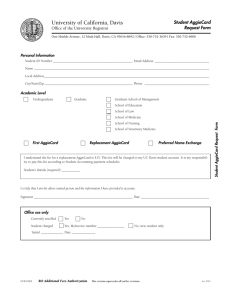UC Davis - Campus Climate Study
advertisement

U C C A M PUS CLI M AT E S T U DY UC Davis EXECUTIVE SUMMARY PREPARED BY RANKIN & ASSOCIATES CONSULTING Project Structure and Process Key Findings - Areas of Strength The UC Davis survey contained 107 questions including several open-ended questions for respondents to provide commentary. The survey was offered in English and Spanish and distributed from January 31, 2013 through March 15, 2013 through a secure on-line portal.ii Confidential paper surveys were available to those who did not have access to an Internet-connected computer or preferred a paper survey. 1. High levels of comfort with the climate at UC Davis Description of the Sample at UC Davis UC Davis community members completed 18,466 surveys for an overall response rate of 32%. Response rates by constituent group varied: 25% for Undergraduate Students (n = 6,377), 24% for Graduate/Professional Students (n = 2,154), 51% for Post-Docs (n = 400), 22% of Trainees (n = 176), 38% for Union Staff (n = 3,713), 26% for Faculty (n = 1,301), and 63% for Non-Union staff (n = 3,847). Table 1 provides a summary of selected demographic characteristics of survey respondents. The percentages offered in Table 1 are based on the numbers of respondents in the sample (n) for the specific demographic characteristic.iii Only surveys that were at least 50% completed were included in the final data set for analyses. 28 UNIVERSITY OF CALIFORNIA • 80% of all respondents (n = 14,812) of all respondents were “comfortable” or “very comfortable” with the climate at UC Davis while 7% (n = 1,288) were “uncomfortable” or “very uncomfortable.” • 77% of all respondents (n = 14,101) of all respondents were “comfortable” or “very comfortable” with the climate for diversity in their department/work unit/academic unit/college/ school/clinical setting while 10% (n = 1,872) were “uncomfortable” or “very uncomfortable.” • 76% of Undergraduate Students (n = 4,805), 82% of Graduate/Professional Students (n = 1,771), and 89% of Faculty and Post-Doc respondents (n = 966) were “comfortable” or “very comfortable” with the climate in their classes, while 6% of Undergraduates (n = 343), 8% of Graduate/Professional Students (n = 64), and 2% of Faculty/Post-Docs (n = 23) were “uncomfortable” or “very uncomfortable.” Table 1. UC Davis Sample Demographics Characteristic Subgroup n Position Status Undergraduate Studentsiv 6,377 34.5 Graduate/Professional Students 2,154 11.7 Facultyvi 1,301 7.1 8,058 43.6 v Staff vii Post-Doctoral Scholars/Trainees viii Gender Identity Women Men Transgender White 9,084 49.2 Underrepresented Minorityxi 3,309 17.9 Other People of Color 5,487 29.7 xii Heterosexual Lesbian, Gay, Bisexual, Queer 273 1.5 15,389 83.3 1,214 6.6 Questioningxiv 156 0.8 Asexual 938 5.1 xv Religious/Spiritual Affiliation 36.6 0.6 Multi-Minority Disability Status 6,763 0.2 xiii Citizenship Status 3.1 62.3 35 Genderqueerx Sexual Identity 576 11,521 104 ix Racial Identity % of Sample U.S. Citizen 17,447 94.5 Non-U.S. Citizen 934 5.1 Undocumented 26 0.1 No disability 14,414 78.1 Disability (physical, learning, mental health/ Psychological condition) 3,204 17.4 Christian affiliationxvi 6,740 36.5 1,190 6.4 Muslim 235 1.3 Jewishxix 309 1.7 No affiliation 8,086 43.8 Multiple affiliationsxxi 1,075 5.8 831 4.5 Other Religious/Spiritual affiliation xvii xviii xx Unknown Note: The total n for each selected demographic characteristic differs due to missing data CAMPUS CLIMATE STUDY 29 2. Faculty and Staff - Positive attitudes about work-life issues • About four-fifths of the respondents thought UC Davis demonstrated that it values a diverse faculty (80%, n = 9,515) and staff (82%, n = 9,743). • 68% of Faculty, Staff, Post-Doc/Trainee, and Graduate/Professional Student respondents found UC Davis supportive of their taking leave (n = 8,145), and 66% felt that UC Davis was supportive of flexible work schedules (n = 7,850). • A substantial majority of all Faculty, Staff, PostDoc/Trainee, and Graduate/Professional Student respondents believed that they had colleagues or co-workers (77%, n = 9,196) and supervisors (67%, n = 8,003) at UC Davis who gave them career advice or guidance when they need it. 3. Students - Positive attitudes about academic experiences • 80% of Graduate/Professional Students (n = 1,713) and 68% of Undergraduate Students (n = 4,303) were satisfied with their academic experience at UC Davis. • 94% of Undergraduate Students (n = 5,931) and 96% of Graduate/Professional Students (n = 2,045) intended to graduate from UC Davis. 4. Students and Trainees – A majority of respondents found the courses offered at UC included sufficient materials, perspectives, and/or experiences of people based on a variety of personal characteristics (e.g., age, ethnicity, gender identity, marital status, race, sexual orientation) 30 UNIVERSITY OF CALIFORNIA Key Findings - Opportunities for Improvement 1. Some members of the community experience exclusionary conduct • 24% of respondents (n = 4,371) believed that they had personally experienced exclusionary, intimidating, offensive and/or hostile conduct; 8% of respondents (n = 1,538) indicated that the conduct interfered with their ability to work or learn.xxii • Differences emerged based on various demographic characteristics including position status, ethnic identity, racial identity, and discipline of study. For example, оо A higher percentage of Staff respondents reported experiencing this conduct as compared to Faculty or Students. оо A higher percentage of women, transgender, and genderqueer respondents than men respondents experienced this conduct. 2. Several constituent groups indicated that they were less comfortable with the overall campus climate, workplace climate, and classroom climate • Staff and Faculty respondents were less comfortable when compared with Post-Doctoral Scholar/Trainee and Undergraduate and Graduate/ Professional Student respondents with the overall campus climate at UC Davis and the with the climate in their departments/work units. • LGBQ respondents were less comfortable than heterosexual respondents with the overall climate and less comfortable with the climate in their classes. • Underrepresented Minority respondents and Other People of Color respondents were less comfortable than White respondents and MultiMinority respondents with the overall climate and the workplace climate. White respondents were more comfortable with the climate in their classes than other racial groups. 3. A small but meaningful percentage of respondents experienced unwanted sexual contact a. 2% of respondents (n = 443) believed they had experienced unwanted sexual contact while at UC Davis within the last five years. Subsequent analyses of the data revealed the following: • Higher percentages of Undergraduate Students (4%, n = 248) experienced unwanted sexual contact in the past five years as compared to Graduate/Professional Students (1%, n = 25), Staff (2%, n = 147), Faculty (1%, n = 14), or PostDocs/Trainees (2%, n = 9). • In terms of gender identity, higher percentages genderqueer respondents (7%, n = 7) and women respondents (3%, n = 345) experienced this conduct as compared to men (1%, n = 93). Additional findings disaggregated by position and other selected demographic characteristics are provided in more detail in the full report. CAMPUS CLIMATE STUDY 31 U C C A M PUS CLI M AT E S T U DY UC Davis SUMMARY PREPARED BY UC Recent efforts in campus climate • UC Davis launched the Hate-Free Campus Initiative (HFCI) in fall 2010 to proactively engage the entire campus community in educational programs, training and activities designed to confront and stop acts of hate, foster a greater awareness and appreciation for diversity, promote civility and respect in interactions, and support its Campus Principles of Community. • Davis increased the number of Student Campus Climate Internship positions at the Cross Cultural Center from two to three, and created a Diversity Leadership Development Program course for undergraduate students to reinforce the campus’ commitment to diversity and inclusion. • The campus increased the number of workshops in Staff Development and Professional Services, Dialogues on Diversity Certificate Training Program. • The Campus Community Council was created to improve information-sharing, help raise issues meriting focused attention, and enhance collaboration and consultation. • • 32 The UC Davis Ombuds Office was established as a place where faculty, staff, postdocs, and administrators are welcome to come and talk in confidence about any concern. UC Davis revised its Student Communication Plan for Reporting Campus Climate and Hate/Bias Incidents. UNIVERSITY OF CALIFORNIA • The Director of Campus Dialogue and Deliberation position was created to sustain ongoing, rather than episodic, commitment to civic engagement. • The Police Accountability Board (PAB), a civilian oversight board for the campus police department, was created to strengthen relationships between the campus community and police by establishing an open, transparent process for people to bring forth complaints of misconduct. • The new UC Davis Advance Program (focused primarily on faculty) includes the Inclusive Campus Climate Initiative, developed to establish programs to reduce the impact of unconscious bias in faculty hiring and promotions; the Policy & Practices Review Initiative, designed to identify and remove institutional barriers to inclusion and career development; and the Campos Initiative (Center for the Advancement of Multicultural Perspectives), a research center designed to attract women and Latina STEM scholars. • UC Davis hired two Graduate Diversity Officers to help recruit more graduate students from diverse backgrounds and ensure successful completion of their degrees. • The campus is developing an online Principles of Community Training Module for all freshmen and transfer students, to be completed within the first quarter of enrollment. • • The UC Davis Health System created the position of Associate Vice Chancellor for Diversity and Inclusion to direct programs and initiatives within the health sciences units. This includes the Framework for Diversity strategic plan, focused on strengthening the Health System’s diversity and inclusion messaging and promoting the recruitment and retention of a diverse pool of students, residents/fellows, faculty, and staff. UC Davis has been designated an Hispanic-Serving Health Professions School to enhance recruitment of Hispanic students, residents/fellows, and faculty from 26 academic institutions with similar designations, and to enhance grant and fellowship opportunities. Process and next steps for developing actions and initiatives based on survey findings UC Davis will re-constitute the Local Campus Climate Work Group (LCCWG) to implement the campus climate survey. Numerous committees are in place to address issues related to campus climate in the campus’ current structure, including, for example: • Staff Affirmative Action & Diversity Advisory Committee (SAADAC) • Disability Issues Administrative Advisory Committee (DIAAC) • Status of Women at Davis Administrative Advisory Committee (SWADAAC) • Academic Senate/Federation Affirmative Action & Diversity Committee • Campus Council on Community and Diversity (CCC&D) • Campus Community Council • UCDHS Equal Opportunity and Diversity Committee After the climate survey results are released, UC Davis will use these committees to assist the LCCWG in identifying important issues, establishing a set of priorities, and creating action plans. The AEVC for Campus Community Relations and the AVC for Diversity & Inclusion at the UCDHS will coordinate this process. CONTACT Davis campus: http://occr.ucdavis.edu/index.html Sacramento Health Sciences campus: http://www.ucdmc. ucdavis.edu/leadership/bios/acosta_bio.html CAMPUS CLIMATE STUDY 33






